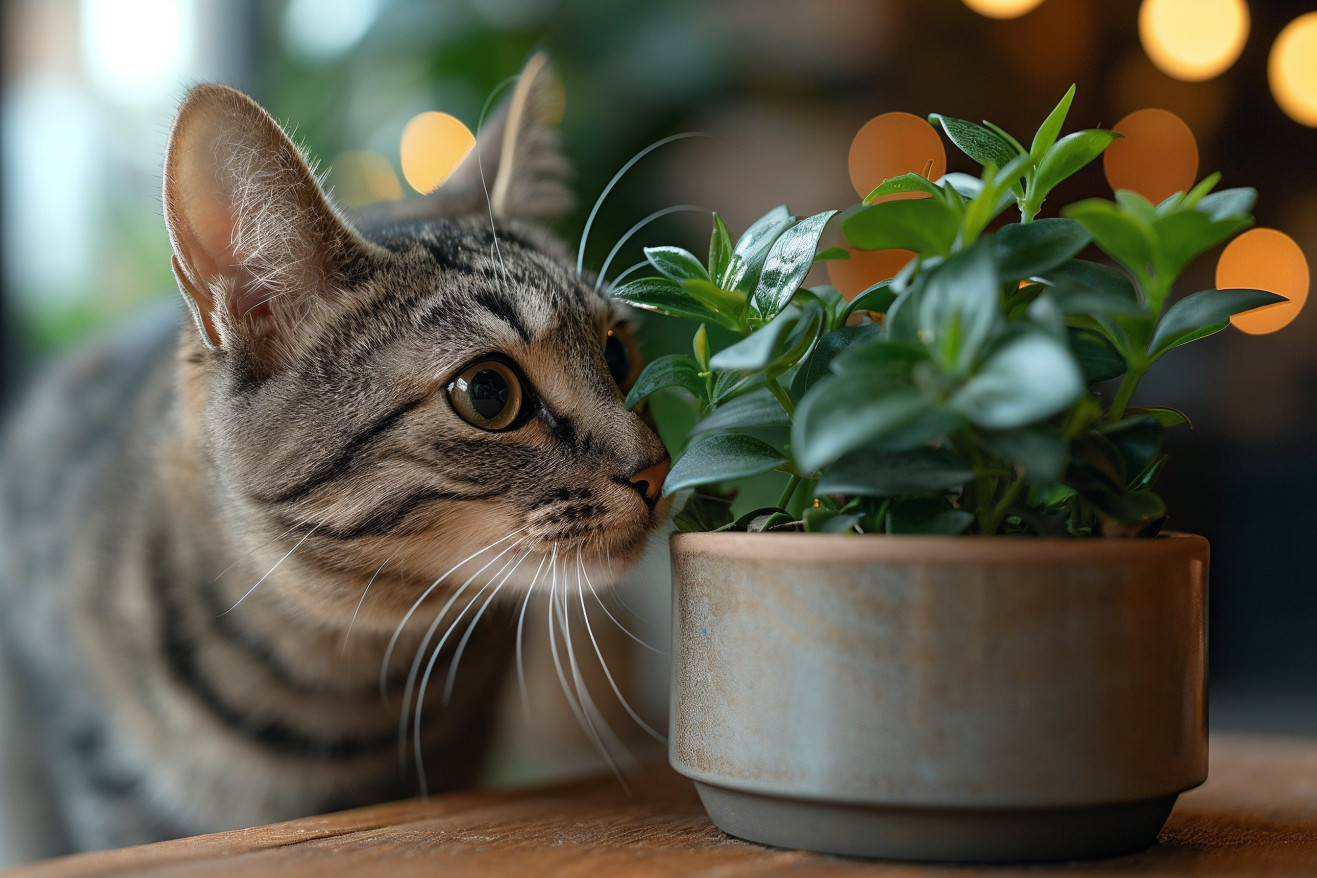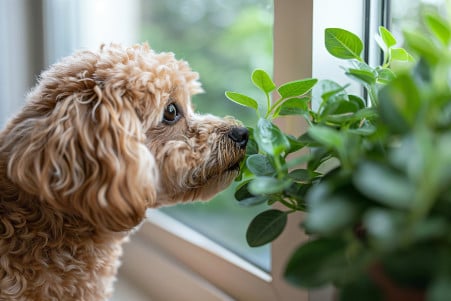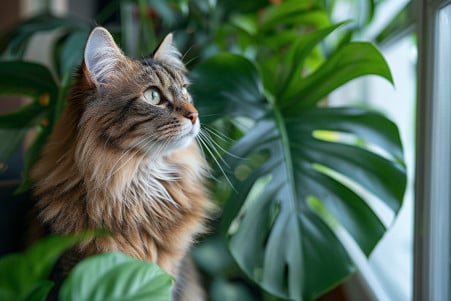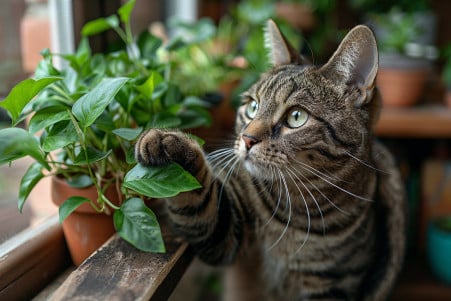Do ZZ Plants Hurt Cats? What You Need to Know
9 February 2024 • Updated 8 February 2024

The beauty of the ZZ plant is hard to deny, but the question of whether or not it’s safe for cats is still up for debate. The answer is that yes, ZZ plants (Zamioculcas zamiifolia) are toxic to cats. They contain calcium oxalate crystals, which can lead to oral irritation, drooling, vomiting, and difficulty swallowing if your cat eats them. As a result, it’s best to keep them away from your furry friends.
We’ll draw on insights from a range of scientific fields, including veterinary toxicology, botany, and pet care studies, to provide a comprehensive look at the risks ZZ plants pose to cats. In this article, we’ll consider research and expert opinions to offer an in-depth understanding of the potential health effects and the steps pet parents need to take to protect and promote their cats’ well-being in plant-filled homes.
Are ZZ plants toxic to cats?
What Happens When a Cat Ingests Calcium Oxalate?
The calcium oxalate in ZZ plants is toxic to cats because it forms needle-shaped crystals that can cause physical harm when ingested. According to the VETgirl Veterinary CE Podcasts, these crystals, called raphides, cause mechanical injury to the oropharynx when ingested. The immediate physiological effects in cats include painful irritation of the mouth, drooling, pawing at the mouth, and swelling that can lead to respiratory distress.
Even more concerning, ingestion of plants that contain soluble calcium oxalate can cause acute kidney injury (AKI)—a life-threatening condition that requires immediate veterinary care. VETgirl Veterinary CE Podcasts explains that ingestion of large amounts of soluble oxalates, which are found in plants like star fruit and rhubarb, can cause hypocalcemia and potentially nephrosis, which is similar to the effects of ethylene glycol (antifreeze) poisoning.
According to the Pet Poison Helpline, treatment for calcium oxalate poisoning usually involves supportive care because there is no specific antidote. This can include IV fluids, pain control, and supportive care to help the cat while it passes the crystals from its system. Understanding this substance and its effects is important for cat owners because it can help them prevent and respond to situations that could put their cats in danger.
How to Tell If Your Cat Has Been Poisoned by a ZZ Plant
If your cat has eaten a ZZ plant, you should look for immediate signs of toxicity, including drooling, oral irritation, vomiting, and difficulty swallowing. These symptoms are caused by the plant’s insoluble calcium oxalate crystals, which can lead to oral pain and potential swelling in the mouth or throat.
If you think your cat has eaten a ZZ plant, you should start by gently rinsing your cat’s mouth with water to remove any remaining plant material and prevent further irritation. It’s important to note that you should not induce vomiting or administer any at-home treatments without consulting a vet, as this could make the situation worse.
You should contact your vet if your cat’s symptoms don’t improve or if your cat has eaten a large amount of the plant. Getting treatment early can help prevent more serious issues.
To keep your cat from eating ZZ plants, Gardening Know How recommends spraying the leaves with citrus, which cats tend to avoid. You can also consider pet-proofing your home with non-toxic plants to completely eliminate the risk. By doing so, you’ll create a safer space for your cat to explore and give yourself peace of mind.
How Is Calcium Oxalate Poisoning Treated in Cats?
If your cat has ingested a ZZ plant and is suffering from calcium oxalate poisoning, it is important to seek immediate veterinary treatment. According to VETgirl Veterinary CE Podcasts, the typical treatment starts with decontamination, which may include flushing the mouth with water or milk to get rid of any remaining plant material and soothe oral irritation.
Other supportive care will be aimed at helping to manage the symptoms, including pain relief with analgesics and anti-emetic drugs to help control vomiting.
In more serious cases, IV fluids may be given to help with dehydration, electrolyte imbalances, and kidney support. Because there is no specific antidote for calcium oxalate poisoning, Pet Poison Helpline explains that treatment is symptomatic and supportive, focusing on helping the body pass the crystals.
Most cats will recover well with appropriate treatment. However, the speed of treatment and the severity of the symptoms will impact the recovery. It is important for the veterinarian to continue to monitor the cat for any potential complications and to make sure that the cat has fully recovered. Pet owners should also be sure to stay in close contact with their veterinarian after treatment to ensure that their cat is recovering as expected.
Plant Safety in Pet-Friendly Homes: Assessing Knowledge and Risk
Even though ZZ plants are a lovely addition to our living spaces, not all pet parents know that they are toxic to cats. As a review in PMC explains, pets are common consumers of indoor plants, which has led to acute and chronic health problems. This suggests that there may be a lack of knowledge among pet parents about the dangers of common houseplants like the ZZ plant.
As a study in Veterinary Clinics: Small Animal Practice explains, plant ingestion was a factor in a large number of animal poisoning cases in the U.S. between 2002 and 2010. However, even though these cases are common, pet parents may not be well-informed about which plants are dangerous. As a survey in PubMed explains, of the 2,150 calls about plant toxicity that were received, 26% were about cats.
Veterinarians and poison control centers, like the Centre National d’Informations Toxicologiques Vétérinaires (CNITV) mentioned in Toxins, help to raise awareness and provide important information to pet parents, and are therefore essential. Awareness about the toxicity of plants like the ZZ plant can be driven by these sources, which can focus on the steps pet parents can take to protect their cats from harm.
Potential Long-Term Effects of ZZ Plant Toxicity in Pets
While the short-term effects of ZZ plant toxicity in pets are well-documented, the long-term effects are less well understood. However, research has shown that chronic exposure to toxic plant compounds, even at low levels, can have long-term effects on animals.
In her paper Toxicity of House Plants to Pet Animals, Zuzana Siroka explains that chronic exposure to toxic plants can have cumulative effects on pets that may not be immediately obvious, making them a potential hidden danger to pets.
Continued exposure to the toxic compounds in houseplants like ZZ plants could worsen existing health conditions or lead to new health problems over time. The potential for chronic toxicity due to low-level exposure and sub-lethal doses is a major concern and a topic that needs more research.
The Merck Veterinary Manual notes that these plants are known to cause immediate local pain and irritation, but the potential for long-term kidney damage or other systemic effects can’t be ruled out without further research.
Pet owners can take steps to protect their pets from the potential of chronic toxicity. By keeping ZZ plants and other toxic plants away from pets or choosing pet-friendly plants, pet parents can reduce the potential for long-term effects and create a safer environment for their pets while still enjoying the benefits of indoor plants.
Cultivating Peace: How to Keep Your Houseplants and Cats Safe
Our investigation has shown that ZZ plants are a hidden danger to cats, due to the calcium oxalate crystals that can lead to oral irritation and potential kidney problems. The evidence is clear: despite their beauty, ZZ plants are a danger to cats.
The need to protect pets from harm is paramount. Knowing the plants in our homes and their potential dangers is an important part of being a responsible pet owner. This means not just knowing the dangers but also taking steps to protect pets from them. This can mean keeping plants like ZZs out of the way of cats or choosing other plants that won’t harm them.
We encourage you to find a way to enjoy your love of houseplants while also keeping your pets safe. You can definitely have both. Let this be a strong reminder that the care we take to protect our pets ensures their well-being and happiness and allows for a safe and peaceful coexistence for all.


